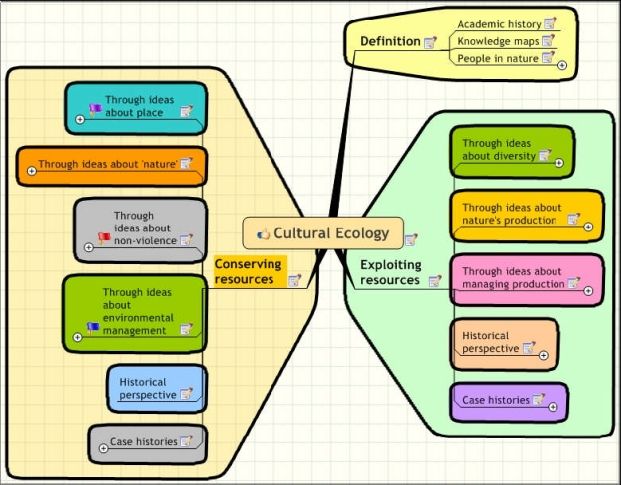Cultural ecology, a burgeoning field within the scope of human geography, posits that the intricate interplay between human cultures and their environments offers profound insights into sustainability, adaptation, and resource management. This disquisition endeavors to illuminate the ways in which cultural ecology exemplifies the interconnectedness of humanity and the natural world, while elucidating its real-world applications, particularly in the context of addressing climate change and promoting ecological stewardship.
At the heart of cultural ecology lies the understanding that human beings do not exist in isolation from their environments; rather, they are inextricably linked to the ecosystems that sustain them. This perspective compels a reassessment of our interactions with the landscape, urging us to cultivate a symbiotic relationship with the natural world. Cultural ecologists examine how cultural beliefs, practices, and technologies shape human responses to their environmental challenges. Through this lens, we uncover the myriad ways in which societies adapt to diverse ecological contexts, from arid deserts to verdant rainforests.
One illustrative example of cultural ecology in action can be found in the practices of indigenous peoples. Indigenous communities have historically developed sustainable agricultural practices that reflect their intimate knowledge of local ecosystems. For instance, the traditional agroforestry methods employed by the Kayapo people of the Amazon rainforest are exemplary of this ecological wisdom. The Kayapo utilize polyculture, planting various species of crops in harmony with native vegetation, thereby enhancing soil fertility and promoting biodiversity. Such practices not only ensure food security but also safeguard against the deleterious effects of monoculture, which can lead to soil degradation and loss of species diversity.
In stark contrast, the industrialized agricultural methods prevalent in much of the Western world exemplify a disconnect between cultural practices and environmental stewardship. The allure of efficiency has often led to practices that exploit natural resources unsustainably, such as the overuse of fertilizers and pesticides. The consequences of these practices are dire; soil erosion, water pollution, and biodiversity loss are just a few of the catastrophic outcomes. This juxtaposition illustrates the promise of cultural ecology: it offers a paradigm shift, encouraging a reevaluation of our food systems in light of indigenous knowledge and ecological sustainability.
Furthermore, cultural ecology extends beyond agriculture. The cultural practices surrounding water management offer another striking example of this relationship. In arid regions where water scarcity is a pressing concern, traditional water conservation techniques provide a blueprint for modern-day strategies. The ancient qanat system, used in the Middle East, exemplifies an innovative approach to channeling groundwater through subterranean tunnels. This system reflects a deep understanding of hydrology and minimizes evaporation losses, allowing communities to sustain agricultural systems in harsh environments.
In contemporary discourse, the innovative applications of cultural ecology inform strategies for addressing climate change. Urban centers, which are often hotbeds of environmental degradation, are beginning to embrace cultural ecologists’ concepts. The integration of green spaces, community gardens, and urban farming initiatives resonates with the principles of cultural ecology, fostering biodiversity while enhancing community resilience to climate impacts. These initiatives are not merely aesthetic; they signify a profound shift towards reconceptualizing urban landscapes as living ecosystems, capable of supporting both human and ecological health.
The role of cultural traditions in shaping attitudes toward conservation cannot be overstated. Many cultures have longstanding reverence for nature, which is reflected in their folklore, rituals, and communal practices. For instance, the Maasai people of East Africa regard cattle not only as a primary source of sustenance but also as a central element of their cultural identity. This deep-seated connection engenders a sense of responsibility towards stewardship of the land and its resources. By harnessing these intrinsic values, conservation initiatives can foster greater community engagement and commitment to sustainable practices.
However, the path to integrating cultural ecology into broader environmental policy is fraught with challenges. Globalization and modernization pose significant threats to traditional ecological knowledge systems. As societies evolve, there is a risk that invaluable indigenous practices may be lost or commodified, resulting in a dilution of cultural identity. It is imperative that contemporary policymakers acknowledge and incorporate these practices into sustainability frameworks, preserving and revitalizing the wisdom of previous generations. This, in itself, can catalyze a shift in collective consciousness towards a more harmonious coexistence with nature.
Moreover, cultural ecology beckons curiosity and invites us to explore the dynamic interplay of technology and tradition. The advent of new technologies can both aid and hinder our efforts to cultivate sustainable lifestyles. Innovations such as precision agriculture and renewable energy sources have the potential to revolutionize resource management. However, such technologies must be employed with caution, ensuring that they are inclusive and accessible to all communities, particularly those that have been historically marginalized. This inclusivity is essential not only for equity but also for the richness that diverse perspectives bring to environmental solutions.
In conclusion, cultural ecology presents a compelling framework for understanding the complexities of human-environment interactions. By examining real-world applications, we can discern the profound ways in which culture shapes our ecological realities. As climate change looms ominously on the horizon, the integration of cultural ecological principles into our approaches to sustainability becomes not only relevant but imperative. The quest for ecological harmony requires a collective shift in perspective—a promise that lies at the intersection of traditional knowledge and modern innovation. As curiosity beckons, we are encouraged to embrace a holistic view of ecology that invites all voices into the conversation, fostering a future where humanity and nature coexist sustainably.
